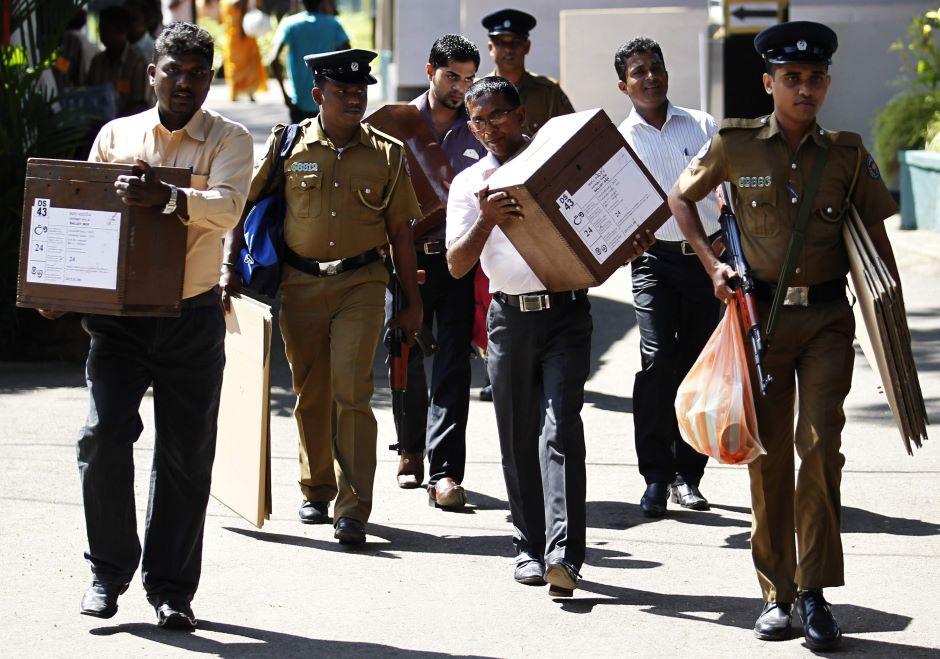Sri Lanka: Ensure Safe, Secure, Free Polls
All Parties Should Keep Violence, Intimidation Out of Elections
Authorities in Sri Lanka should ensure that voters have safe and secure access to the polls to vote in parliamentary elections on August 17, 2015, Human Rights Watch said on August 14. Local monitoring groups have reported numerous incidents of election-related violence and campaigning irregularities in the month leading up to the nationwide polls.

Polling officers carrying ballot boxes walk with a police officer as they prepare to go to their polling centers ahead of presidential election in Colombo on January 7, 2015.
The Centre for Monitoring Election Violence (CMEV), a longstanding independent monitoring organization, documented 135 major incidents, 10 involving the use of firearms, and 624 minor incidents between July 13 and August 13. The major violations occurred primarily in Jaffna, Colombo, Batticaloa, and Gampaha districts. Three people have been reported killed and several injured.
“With evidence already of violence in the run-up to these elections, Sri Lankan authorities should take all necessary steps to protect voters and party supporters from attacks, threats, and intimidation,” said Brad Adams, Asia director. “The authorities should also ensure that voters can travel safely and securely to the polling booths and back.”
Over the past month there have been several assaults during campaign-related activities. Some attacks have led to death or grievous injury. On July 31, a shooting at a United National Party (UNP) event led to the death of Ms. S. Maheema, a UNP supporter. No one has been arrested in the shooting. Local police confirmed that on August 5, a supporter of the United People’s Freedom Alliance (UPFA), Mohamed Adhiyas, was attacked with a sharp object, allegedly by a member of the rival UNP. Adhiyas was pronounced dead on arrival at the hospital. On August 5, supporters of a United National Front (UNF) candidate were attacked by supporters of the UPFA, leading to several injuries. Also on August 5, supporters of the Sri Lanka Muslim Congress allegedly threw stones at UNF supporters, causing injuries requiring hospitalization.
In addition, CMEV has documented other campaign violations such as finding forged ballot papers, arson attacks, and acts of vandalism and intimidation. In some cases, the police were able to identify and arrest the perpetrators.
“Sri Lanka has a long history of attackers getting away with election-related violence. A few arrests, while a positive step, do not address these longstanding concerns,” Adams said. “State authorities need to pursue each attack vigorously to send an unequivocal message that there will be no obstacles to fair and free elections.”
CMEV also reported misuse of state resources and other violations of campaign rules by the various political parties, including the use of government employees for election campaigning. CMEV also expressed concern about allegations that some local election monitors were not remaining neutral and were acting on behalf of certain political parties.
The Sri Lankan Election Commission and the state security forces had played a constructive and neutral role during the January 8 presidential elections. Those authorities should ensure that police and other security forces act in an impartial manner throughout the electoral process and respect the human rights of all voters.
“The role played by the security forces during and after election day will send an important message about the future of human rights in Sri Lanka,” Adams said. “Meeting the basic requirements of a free and fair election is an important step toward addressing the country’s persistent rights problems.”
Source: Human Rights Watch
- 360 reads
Human Rights
Ringing FOWPAL’s Peace Bell for the World:Nobel Peace Prize Laureates’ Visions and Actions

Protecting the World’s Cultural Diversity for a Sustainable Future

The Peace Bell Resonates at the 27th Eurasian Economic Summit

Declaration of World Day of the Power of Hope Endorsed by People in 158 Nations

Puppet Show I International Friendship Day 2020

